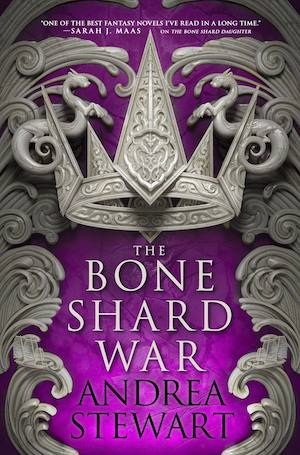There are plenty of interesting facets and elements to admire in Andrea Stewart’s The Drowning Empire trilogy, from a unique system of magic to a fantasy world—the Phoenix Empire, a series of islands on the Endless Sea—that doesn’t feel like a region of our world with a few names changed and some magical beasties thrown in for good measure. Add plenty of palace intrigue into the mix, and fortify it with a number of sympathetic characters with conflicting agenda and you have the makings of a memorable series.
Book one, The Bone Shard Daughter, introduced most of the trilogy’s major characters, including the two at the heart of all three books. Lin begins the series believing herself to be the Emperor’s daughter, and eventually learns that she is herself a construct, made from the bodies of countless other people, and with the ability to create bone shard-powered constructs of her own. Her aristocratic perspective contrasts with that of Jovis, a smuggler and reluctant hero, and by the end of the first novel, Lin had deposed her father and allied with Jovis.
Buy the Book


The Bone Shard’s War
That allegiance was tested in The Bone Shard Emperor, in which the duo learn about the history of the Alanga, long-lived magicians who long ago vanished from the Phoenix Empire. Lin’s reign came under attack from a number of factors, including the Shardless Few, a revolutionary group calling for an end to the monarchy, and Nisong, a fellow construct sent into exile by Lin’s father. Lurking in the background was the Ioph Carn, a criminal syndicate that pursued Jovis through the first book.
While many of the conflicts in the series find sympathetic figures on both sides, the clash between the well-intentioned Lin and the Shardless Few being the prime example—The Bone Shard War also introduced Ragan, who stands revealed by the end of the volume as one of the trilogy’s only outright villains. Like Lin and Jovis, he also possesses the skills of an Alanga, which involves bonding with sentient beings known as ossalen. (It’s probably worth mentioning here that Jovis’s ossalen companion Mephi is one of the most endearing characters in the entire series.) And unlike Lin or Jovis—or even Nisong, who has eminently good reasons for her anger with the Empire—he seems far more fixated on power and destruction for their own sake.
If that seems like a lot of recapping, it speaks to the density with which Stewart has plotted these books. Certain plot elements in The Bone Shard War hearken back to the first book, in which Jovis flees from an island that is mysteriously sinking due to copious mining of witstone, one of a few objects that’s central to life in the Empire as it currently exists.
The Bone Shard Emperor ended with Lin and Jovis’s slow-burning affection for one another tested by Jovis needing to depart in search of the kidnapped Mephi. When The Bone Shard War opens, two years have passed and Lin believes Jovis to be dead; meanwhile, Ragan and Nisong have established an alliance of convenience. And while Jovis has not, in fact, died offscreen, the position that he finds himself in this novel is much more tenuous than his arc over the previous books—the leader of the Ioph Carn has used bone shards to control him, and is forcing him to commit violent acts against his will.
This is absolutely the third book in a trilogy; Stewart pays off a number of long-running plot threads here, and the prominence of supporting characters Ranami and Phalue—a couple whose relationship bridges the aristocracy-versus-revolutionaries divide that runs throughout the series—clicks into place here as well, helping to establish how the trilogy’s differing political factions can find some common ground.
While the time jump between books initially threw me for a loop, I began appreciating it more as I got deeper into the novel. It’s difficult to think of any other way in which it might have worked without that time gap; two years’ worth of watching this series’s Han/Lando figure being psychologically tortured would be tough going.
Stewart also does a memorable job of keeping the worldbuilding here—and even some of the expository elements—rooted in the novels’ plot. A method of consuming archived memories that played a significant role in the trilogy’s second book takes on a new significance in this volume, for instance—and by the end, Stewart has revealed a few other things about the nature of the Phoenix Empire that leaves her some interesting avenues to pursue in future books, should she be interested in revisiting this world.
One of the other things about this book, and this trilogy, that make it especially interesting are the ways in which Stewart has used a fantastical setting and devices to deal with a number of themes that are more commonly associated with science fiction. The fact that two of the central characters here were constructed rather than born means that Stewart is dealing with questions of sentience and selfhood, and the notion of whether or not someone made can be said to have a soul. These are not minor questions, nor are they questions to be raised lightly—but by the trilogy’s end, Stewart has reckoned with the line between human and construct, and whether or not it does (or should) exist.
As immersive journeys to another world go, the Drowning Empire books make for a rewarding experience. Thankfully, Stewart sticks the landing in The Bone Shard War, reckoning with the questions you might expect a third volume to deal with—as well as a few that you might not have seen coming.
The Bone Shard War is published by Orbit.
 Tobias Carroll is the managing editor of Vol.1 Brooklyn. He is the author of the short story collection Transitory (Civil Coping Mechanisms) and the novel Reel (Rare Bird Books).
Tobias Carroll is the managing editor of Vol.1 Brooklyn. He is the author of the short story collection Transitory (Civil Coping Mechanisms) and the novel Reel (Rare Bird Books).










